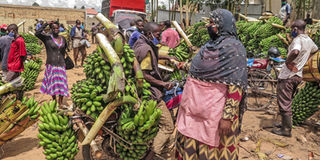Matooke farmers throw away bunch at Shs1,000

A trader negotiates with a farmer at Ntungamo Matooke market in Ntungamo Municipality on Monday. PHOTO BY PEREZ RUMANZI
What you need to know:
- Although President Museveni has since eased restrictions, the farmers’ biggest markets are not fully operational. Schools are still closed, mass gatherings such as burials and parties are still banned while the demand in hotels and restaurants has declined drastically.
Mr Amon Agaba has been selling bananas in Kizungu Matooke market in Kakoba Division, Mbarara District, for five years.
His customers, mainly hotel operators, have been parting with between Shs7,000 and Shs25,000 for each bunch, depending on the size.
But since late March when government imposed several travel restrictions and lockdown on the country to prevent the spread of Covid-19, the farmer can hardly earn a dollar as profit.
“My profit is very small, not more than Shs1,000 per bunch. I have been doing this business for five years and I do not have an alternative,” Mr Agaba says.
He earns a meagre income if he sells a bunch between Shs1,000 and Shs5,000.
For thousands of farmers in Ankole region, this is their only option. They either sell the perishable produce at give-away prices or watch it waste away.
“These prices are for big farmers. You are lucky if a trader comes to your planation and fills his lorry with your produce. Many farmers do not have buyers,” Mr Mathias Tushabomwe, a model farmer in Kabaale Village Rugaaga Sub-county, Isingiro District, says.
Mr Tushabomwe sells a large bunch at Shs3,000 to Shs5,000 while the smallest one could go as low as Shs500 to Shs1,000.
These prices were unimaginable before early March. Farm gate prices ranged from Shs5,000 to Shs20,000 depending on the size of the bunch.
Few customers
Although President Museveni has since eased restrictions, the farmers’ biggest markets are not fully operational. Schools are still closed, mass gatherings such as burials and parties are still banned while the demand in hotels and restaurants has declined drastically.
Mr Johnson Okili, the manager of Lake View Resort Hotel in Mbarara, used to buy 30 to 50 bunches a week at Shs10,000 to Shs25,000 each but they now buy between five and 10 bunches at a much lower price.
“This time used to be a peak season for the hotel. We used to have many activities, including workshops. This is not the case today. It is not only matooke farmers that have been hit hard, even those dealing in vegetables and poultry are stuck with produce,” Mr Okili says.
While some farmers are able to transport their produce to urban areas in Mbarara, Kampala and Masaka, they still suffer the same fate - low demand.
“Buyers are now scarce, the markets in Bwizibweera and Rutooma towns [in Mbarara] no longer attract traders from Kampala like before,” Mr Asaph Mugizi, a farmer in Kacwamba in Rwanyamahembe Sub-county, Mbarara, says.
Mr Mugizi is also the chairperson of Uganda Banana Producers Cooperative Union, which has 25,000 members and 2,400 commercial contact banana farmers in banana-growing regions of the country. For a commercial farmer, he says they spend at least Shs250,000 on producing 150 bunches monthly.
The cost takes care of organic manure, hiring labour, among other necessities to maintain the plantation.
“The market is no more, farmers are making losses,” he adds.
Mr Mugizi admits that value addition and collective marketing is the only way to save the business.
“The union is promoting value addition. The government is already moving in that direction, although the banana factory in Bushenyi District is still operating at a low scale,” he says.
Banana Industrial Development, the only banana factory in the country, buys the produce from 14 cooperatives in greater Bushenyi and some individuals outside the region.
Currently, it pays farmers Shs350 for a kilogramme of bananas.
This has shielded Mr Elly Tayebwa, a farmer in Nyakatugunda Village, Bumbaire Parish Bumbaire Sub-county in Bushenyi from incurring losses.
The farmer sells his produce through Bumbaire Banana Farmers’ Cooperative Society.
“I sell 800 to1,000 kilogrammes every two weeks. The society has helped us in marketing bananas. I have not had challenge of market,” Mr Tayebwa says.
Mr Dickson Muruhara, a research assistant in the production department at the factory, says they process 10 tonnes of bananas daily, adding that there are plans to expand production.
On how they determine the prices, he says: “We do weekly price surveys which guides us how much we pay the farmers. We have not reached everyone because we want to go through cooperatives.”
Value addition
Some farmers sell their produce to the banana factory in Bushenyi. It makes Raw Tooke Flour from bananas which are nine to 10 weeks old. The flour is used in making bakery products. The factory also produces Instant Tooke Flour from mature bananas of 15 and above weeks, which is used in making Tooke meal and Tooke porridge.




